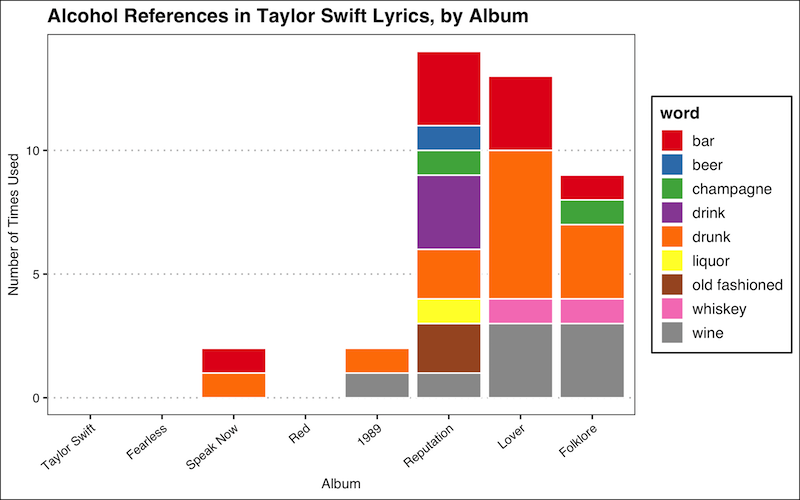Edit 12/12/2020: Ms. Swift has been much more productive than I have this year and released another album, so this is updated with Evermore lyrics
Several years ago, I listened to Taylor Swift’s Reputation album and noticed lots of references to alcohol. I was in my early 20s and it reminded me of the self-conscious way college freshmen pepper their conversation with allusions to drinking (“I mean, of course we’re going to pre-game our suite-mate’s a cappella concert! Do you have any mixers?“)
It was funny and emblematic of Swift’s evolution as a cultural icon and human. She came onto the scene with Teardrops on my Guitar in 2006, an innocent teenager crooning pop-country. In the years that followed, she had lots of high-profile relationships and breakups, fought with Kanye, left the country twang behind, and made a ton of money and chart-topping albums. Seeing her start to sing a little too much about alcohol was a lens into the way her music progressed and her brand blew up into a global force.
Since then, I’ve continued to watch her progression with a mixture of amusement and respect. And since she dropped a surprise album the other night, I figured now is a good time to check in on her lyrics and see what’s on Taylor Swift’s mind in 2020.
Taylor Swift’s References to Alcohol by Album
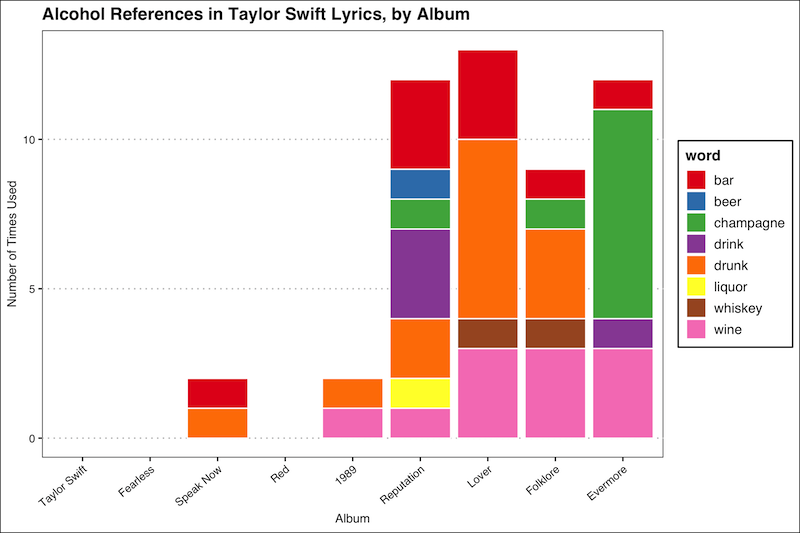
Just like me and my freshman floor-mates, Swift has toned down the alcohol references a bit! Listening to the new album, it feels much subtler than Reputation. I for one am happy for Taylor’s health that she’s being more mindful in her drinking.
There was another lyrical oddity that jumped out at me listening to Folklore for the first time, though. This one is amusing personally because I got it out of my system a fair bit earlier than college, but I suppose everyone goes through phases at their own pace. Taylor Swift has started swearing a lot!
Taylor Swift says “Fuck” for the first time
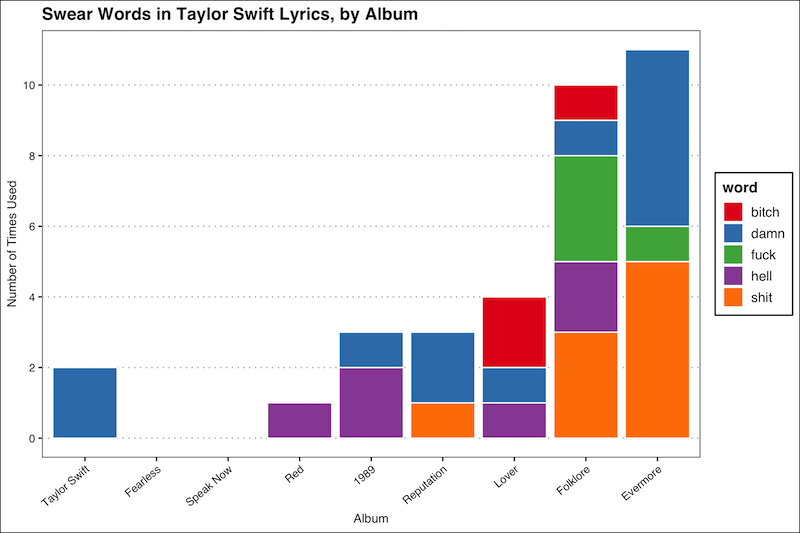
Edit: Swift just kind of popped off with swear words in 2020, good for her
Swift employs colorful language in this album, as evidenced by that big green bar above Folklore. I am very curious how strategic her use of curse words is. It makes sense that her core demographic has mostly graduated high school now and can listen to explicit songs without worrying about parental consent. So she can afford to play it faster and looser, but I would really like to know if this is calculated on her part or she is jut reacting to the stress of life in 2020 by dropping some F-bombs. Taylor, if you’re reading this, get at me on twitter and let me know.
How many people are involved in writing Taylor Swift’s songs?
In keeping with my question about how calculated her decisions on lyrics are, I was curious about whether these songs are written “by committee” or if they are mostly organic, and if that’s changed over time. On the one hand, for an artist generating as much money as Swift, it would make sense for lots of people to want to weigh in on the content. But on the other hand, she clearly has a good sense of what her audience wants and what sells, so it might make sense to just keep her in control.
In order to look at this in a data-backed way, I took the average number of credited songwriters on each of her albums. Interestingly, it peaked on Reputation, which was also the most alcohol-soaked album:
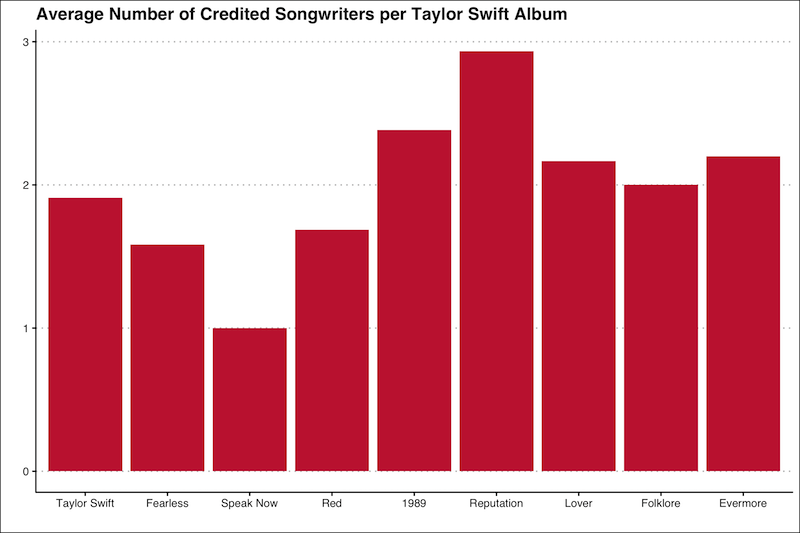
Swift wrote all of the songs on Speak Now by herself, but most of her songs have one or two cowriters, often very high profile musicians. I wonder how much studio execs and the like weigh in on lyrics but aren’t credited; if anyone has any insight into that please reach out.
Swift’s interest in Cardigans
Edit: pretty bummed that the Cardigan theme appears to be an anomaly
This was a final unexpected theme in the new album. The word “cardigan” appears 4 times in Folklore. I guess this fits with the fact that Bon Iver is featured on a song, I feel like he is a cardigan in human form and so she must have been in that sort of headspace. I hope this trend continues and the next album is turtleneck-heavy.
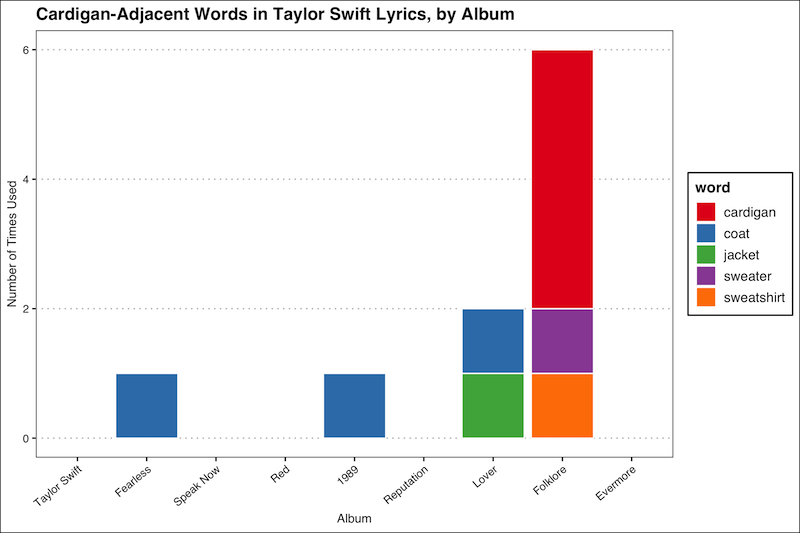
You, Me and Us in Swift’s Lyrics
In part because Swift’s love life is such a point of public fascination, I was curious to see how her writing has changed as reflected in who she’s addressing in her songs.
I looked at the proportion of the lyrics in each album that were focused on the self (“I”, “me”, “mine” etc.), on a second person (“You”, “your” etc.) and a collective (“we”, “our” etc.). The peak of the collective at the 1989 album is really interesting to me; perhaps someone with better perspective on her relationship history could weigh in.
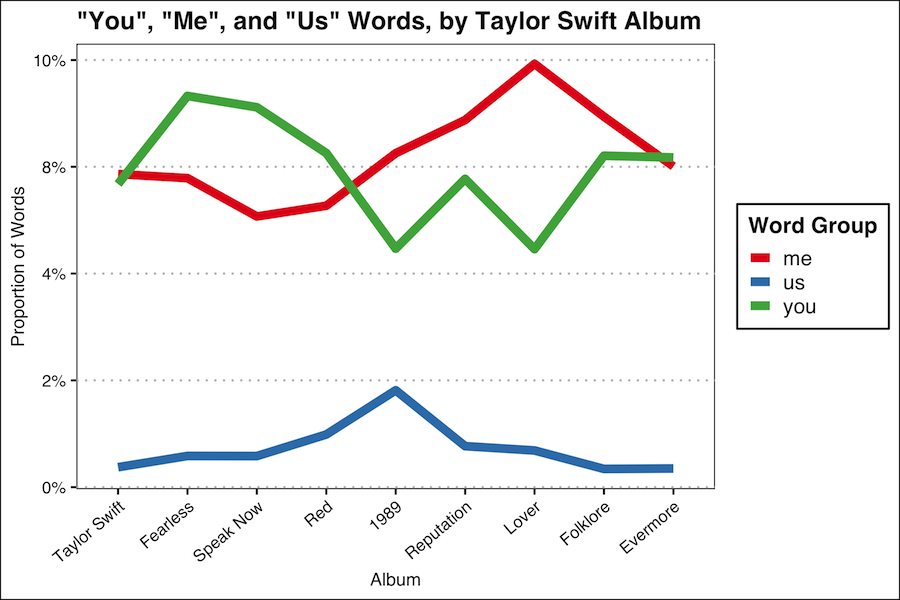
If you have any questions or comments, feel free to reach out to joe @ this website or on twitter. If you’re interested in the technical details of how I did this, check out this post, and thanks to Josiah Perry for making getting the lyrics easy.
If you like this sort of analysis, sign up below and I’ll email you when I write something new:
